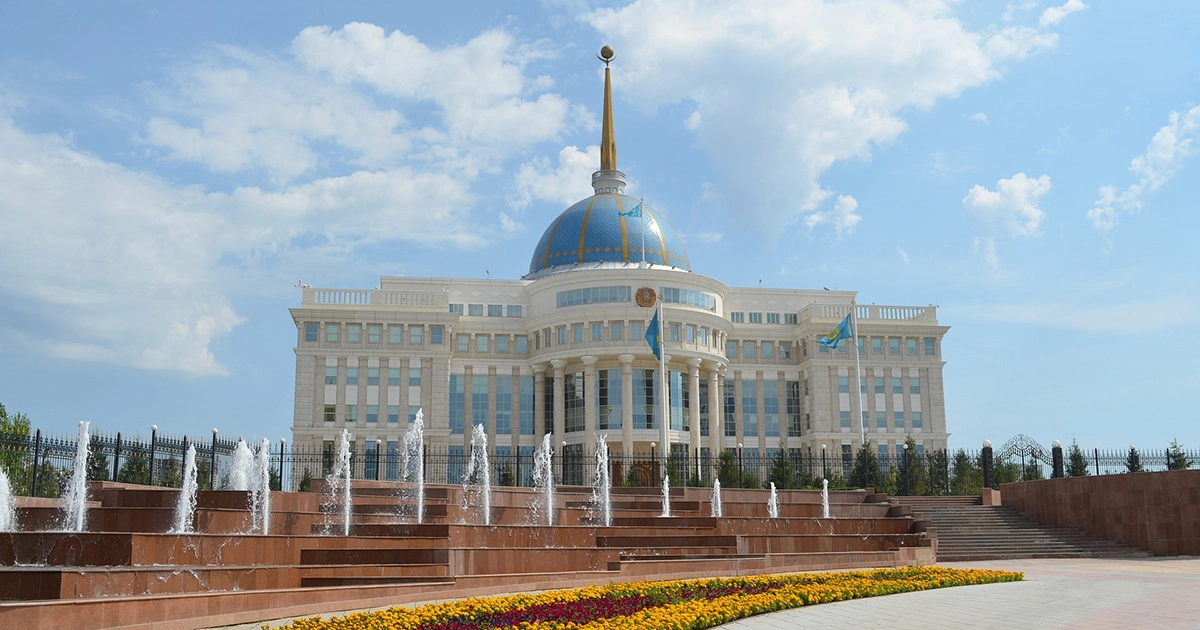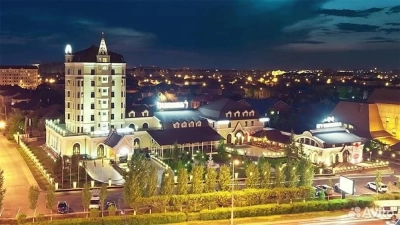Kazakhstan
 Table of contents
Table of contents
Kazakhstan is an original country that keeps pace with the times. This is a unique region rich in cultural traditions. The state is located in the very center of the mainland, occupying its European and Asian parts, which makes Kazakhstan a transcontinental country. The country's policy is pursuing a multi-vector course based on the principles of proactivity and pragmatism.
General information
The official name of the state is the Republic of Kazakhstan. Kazakhstan is the largest state that does not have access to the open sea (except for the inland seas — the Caspian and Aral). Its area is 2,724,900 square kilometers and is the ninth largest in the world. At the moment, 19,644,067 people live in the state. The national currency is Kazakhstan tenge. The official language is Kazakh, but this is a multi-ethnic country, so other languages can be found on its territory. The principles of tolerance have been elevated to the rank of state policy. Kazakhstan has long been a part of the progressive world. For example, oil in the country began to be produced much earlier than the world's competitors in "black gold" — Kuwait and Saudi Arabia.
The capital is located in Astana (before that the city was called Nur-Sultan, again Astana, Akmolinsk, Tselinograd, Akmola). Like most Asian states, Kazakhstan has two "faces". One is modern and high-tech, which the capital of the country, as well as its main metropolis, Alma-Ata, will demonstrate to the traveler. And the second is untouched by civilization, with wild beauty of the steppes and the foothills of the ancient Tien Shan.
History, geography, culture, mentality
The land on which Kazakhstan stands was in ancient times a nomadic steppe, where hundreds of tribes existed. The impetus of the Kazakh nation was given by Genghis Khan and his descendants, the Mongols conquered these lands and ruled until 1369. Foreign occupation united local residents, enriched them with technologies and laws. So, the history of Kazakhstan began thanks to the Mongol invasion and the Silk Road. In the middle of the 18th century, the Kazakh Khanate faced strong pressure from both sides. Russia pressed from above, China pressed from the right.
In order to survive, the Kazakhs chose Russian patronage and until 1847 the country was ruled by loyal pro-Russian khans. In the 1890s, Russian colonization of Kazakh lands intensified, the emperors resettled thousands of Russian peasants and Cossacks to nomadic lands, built military fortresses and prisons. By 1912, more than 500 thousand Russians lived here. After World War II, Khrushchev sent thousands of Komsomol members to Kazakhstan to raise virgin soil. The builders of communism built Baikonur, heavy industry and huge factories. The Kazakhs began to grow rich and gain strength. So Kazakhstan became the most pro-Russian region of Soviet Asia.
In December 1991, Kazakhstan declared independence. Nursultan Nazarbayev, maneuvering between Eastern conservatism and European democracy, created the strongest and richest state in Central Asia.
The Republic of Kazakhstan occupies a very favorable geographical position, being in the central part of the Eurasian continent, at an equal distance from the Atlantic and Pacific oceans. In the east, north and northwest, the state borders on Russia, in the south — on the countries of Central Asia — Uzbekistan, Kyrgyzstan and Turkmenistan, and in the southeast — on China. The total length of the country's borders is 12.2 thousand kilometers, of which 600 pass through the waters of the Caspian Sea.
The main wealth of the country is minerals. According to experts, almost all the elements of the periodic table are located in the bowels of the Kazakh land. The country is also distinguished by landscape diversity. Among the natural attractions of Kazakhstan are: the northern range of mountains, which is part of the famous Tien Shan, a section of the Altai mountain system and, of course, Saryarka. The climate of Kazakhstan is sharply continental, with cold winters and hot summers. The weather can vary significantly in different regions of the country. In 2008, the Naurzum and Korgalzhyn state reserves of Kazakhstan received UNESCO status.
The culture of Kazakhstan is the richest layer of the history of the Kazakh people, which has been formed over many centuries. The main attraction of Kazakhstan has been and remains the Great Steppe — the "visiting card" of the Republic and a silent witness to the events of a thousand years ago. Under the influence of its harsh beauty and the hard life of nomads, the Kazakh culture that we know today appeared. Generously laid dastarkhan, elegant and at the same time functional dwellings-yurts, felt products of unprecedented beauty, clothes and headdresses with skillful patterns, horse games, the art of eloquence, competitions of akyns — all this is the culture of Kazakhstan, diverse and very original. Despite the large number of diverse religions in the country, the bulk of the population is divided into Muslims who profess Sunni Islam and adherents of Russian Orthodox Christianity.
Hospitality is a distinctive feature of the Kazakh mentality. Since ancient times, the Kazakhs received travelers as close people, fed, watered, gave shelter and bed, and only after rest did they find out from the guest who he was and where he was heading. At present, the tradition of receiving guests with all honors is preserved in Kazakhstan. If you come to visit a Kazakh, then a huge table with all the delicious dishes will be set for you. The Kazakh people are proud of their history and culture, they remember and honor all the exploits of the batyrs and will gladly share stories about victories and conquests.
Also, almost every Kazakh knows about his ancestors up to the seventh generation. Big relatives are the pride of the Kazakh people. Caring for your loved ones and helping even the most distant relatives is considered a natural manifestation of humanity. Kazakh boys and girls strive to acquire a diploma and preferably more than one. To date, the level of education in Kazakhstan is quite high, the number of higher educational institutions is impressive.
Power
Officially, Kazakhstan is a democratic, secular, constitutional unitary republic. The President of the Republic of Kazakhstan is the head of state, its highest official, who determines the main directions of the domestic and foreign policy of the state and represents Kazakhstan within the country and in international relations. The government exercises executive power, heads the system of executive bodies and manages their activities. Legislative functions are performed by the Parliament, which consists of two Chambers — the Senate and the Mazhilis, acting on a permanent basis. The Mazhilis consists of one hundred and seven deputies. In 2016, 6 parties passed in the elections to the Mazhilis.
As a leader in Central Asia, the republic makes a significant contribution to strengthening the stability of the region. The country has also achieved great success on the world stage. This is evidenced by the chairmanship of Kazakhstan in the OSCE and the holding of the Summit of this authoritative international organization in December 2010 in Astana. A significant initiative of the country was the launch and development of the CICA project, the Asian analogue of the OSCE. Positive feedback was received by the creative activity of Kazakhstan as the chairman of the leading organization of the Islamic world - the OIC. The country is also a recognized leader in the global anti-nuclear movement.
Economy
The country dominates Central Asia economically and politically, generating 60 percent of the region's GDP, largely from its oil and gas industry. It also has extensive mineral resources.
Currently, the state program of "electronic government" in Kazakhstan has been implemented. With the development of information technologies, it became possible to effectively work with state structures, in particular, in the provision of public services to the population and business structures. The country's mineral resource base consists of more than 5,000 deposits, the estimated cost of which is estimated at tens of trillions of dollars. Kazakhstan also has significant oil and gas resources (9th in the world in terms of proven oil reserves), which are concentrated in the western regions. Kazakhstan is among the top ten world grain exporters and is one of the leaders in the export of flour. One of the leading areas of agriculture is animal husbandry.
The main export commodities are the products of the mining, fuel and energy, metallurgical and chemical industries, as well as the grain industry. The main trading partners of the republic are Russia, China, the states of Europe and the CIS. To diversify the economy, the country is successfully implementing a program of industrial and innovative development, in accordance with which old enterprises are modernized and new enterprises are opened.
Kazakhstan is implementing a large-scale project "The New Silk Road", which should revive the country's historical role as the main connecting link of the continent and turn it into the largest business and transit hub of the region — a kind of bridge between Europe and Asia. Kazakhstan has embarked on the implementation of the "Plan of the Nation — 100 Concrete Steps", which provides for fundamental changes in order to implement the Five People's Reforms:
- formation of a professional state apparatus,
- ensuring the rule of law,
- industrialization and economic growth,
- identity and unity
- formation of an accountable state.
A large-scale social modernization of the country is being carried out — new schools, professional colleges and universities are being built, modern medical clinics and hospitals are being opened, and the system of social support for the population is being improved.
Kazakhstan started implementing the Green Economy Plan in 2013. It committed Kazakhstan to meet 50 percent of its energy needs from alternative and renewable sources by 2050. According to forecasts, the green economy will increase GDP by 3 percent and create about 500,000 jobs.
Business climate
In recent years, Kazakhstan's position in terms of the business climate in the country has improved significantly. Among all the countries of the CIS and the EAEU, Kazakhstan has the most liberal tax conditions, the lowest tax rates, and good performance in many respects. Foreign investors are required by law to hire at least 90% of the ordinary staff, at least 50% of the senior management of the citizens of Kazakhstan. The republic plans to introduce minimum requirements for the country to receive more than just taxes from such foreign companies.
You can open a legal entity in Kazakhstan in two hours. In Kazakhstan, the principle of a single window operates, and the document flow takes place in electronic format. The most popular form of registration is LLP (limited liability partnership). IP can also be opened. On the simplified taxation system, the rate for individual entrepreneurs and limited liability partnerships is only 3% of the turnover. The VAT rate is 12%. Kazakhstan has a leading position among the EAEU countries in such areas as "Protection of investors", "Taxation", "Execution of contracts" and "Resolution of insolvency".
Investment climate
From the first days of gaining independence, Kazakhstan has set itself the task of attracting investors to the country's economy through the constant improvement of the investment climate and the creation of favorable and unique conditions for them, since attracting foreign direct investment plays a key role in the development of the state. The basis of the bilateral relations of the state is a strong contractual and legal framework. In general, today Kazakhstan has signed 47 bilateral and 1 multilateral (EAEU) intergovernmental Agreement on the promotion and mutual protection of investments.
Since independence, Kazakhstan has attracted $330 billion in foreign direct investment from over 120 countries. The US State Department states that Kazakhstan is considered the country with the best investment climate in the region.
Thanks to the conditions created for business, more than 8 thousand companies with foreign capital are currently successfully operating in the republic, including world-famous manufacturers included in the Fortune-500 list: Chevron, Siemens, Microsoft, General Electrician, Coca-Cola, Danone, Henkel. The main investor countries are the Netherlands, USA, Switzerland, China, Great Britain, Russia.
Business and investment support structures
In 2014, President Nazarbayev signed into law a tax break to encourage foreign direct investment, which included a 10-year corporate tax exemption, an eight-year property tax exemption, and a 10-year freeze on most other taxes. Other incentives include a return on investment of up to 30 percent once a production facility is put into operation. One of the factors attracting foreign direct investment is the country's political stability.
In order to implement the 100 Concrete Steps Nation Plan, the International Arbitration Center (IAC) and the AIFC Independent Court have been established on the territory of the Astana International Financial Center (AIFC). The AIFC Court is an independent body that provides fair and impartial resolution of commercial and civil disputes based on the principles of English jurisprudence. AIFC judges are persons working in the legal and judicial fields of the UK.
Holding "Baiterek"
It plays an active role in the sustainable development of micro, small and medium enterprises in Kazakhstan through the implementation of sophisticated and effective support instruments. This is an advanced development institution that provides business support tools in accordance with the best standards and improves the living standards of the population of the Republic of Kazakhstan. It includes many state and non-state companies.
JSC Entrepreneurship Development Fund Damu
The main operator of programs for the development of small and medium-sized businesses is a subsidiary of the Holding — Damu Entrepreneurship Development Fund JSC. The Fund offers a wide range of products and services for entrepreneurs: financing under lending programs through second-tier banks, microfinance organizations, leasing companies and other legal entities, subsidizing interest rates on loans, guaranteeing loans, consulting support and project support for entrepreneurs.
JSC "Industrial Development Fund"
It is a subsidiary of the Development Bank of Kazakhstan JSC and is part of the Baiterek National Management Holding JSC. The company provides medium- and long-term financial leasing services in priority sectors of the economy for the state, such as manufacturing, manufacturing and transport infrastructure.
Kazyna Capital Management JSC
This is a private equity fund established in 2007 to promote the sustainable development of the national economy, build a private equity infrastructure in Kazakhstan, attract foreign investment in priority sectors of the economy, use leading international experience, and transfer innovative knowledge and technologies to private equity. For small and medium-sized businesses, large businesses, a concessional financing program is offered with the involvement of second-tier banks at the expense of Kazyna Capital Management JSC. The Program provides for attractive financing conditions: an interest rate of 8% per annum, an investment amount of up to 5 billion tenge for a period of up to 10 years.
JSC "Agrarian Credit Corporation"
It is focused on lending investment projects in the agro-industrial complex, financing spring field and harvesting work, funding credit partnerships, microfinance organizations, leasing companies, second-tier banks for subsequent lending to agribusiness entities.
Company JSC "KazAgroFinance"
It can provide entrepreneurs with technical equipment for the agro-industrial complex of the Republic of Kazakhstan, providing high-quality leasing services. The company provides agribusiness entities with an opportunity to purchase various types of agricultural machinery and equipment of domestic and foreign production.

Tags:

2,665,334,000 ₽
1,294,590,800 ₽
2,741,486,400 ₽


427,307,650 ₽


 New artıcles
New artıcles

 REAB Services
REAB Services
 News
News
 Useful tip
Useful tip

